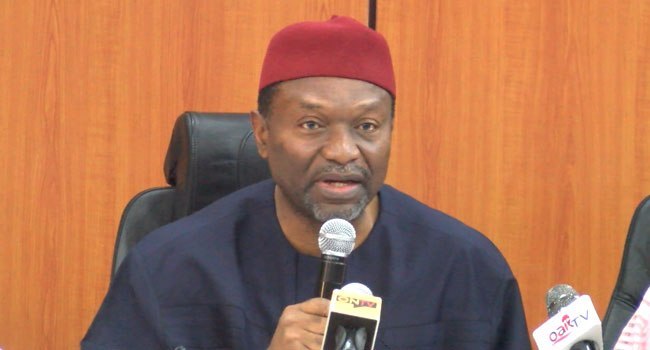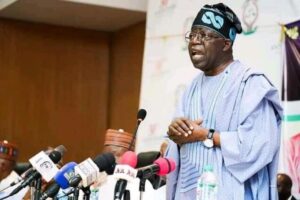
The federal government made slight adjustments on the 2019 Medium Term Fiscal Framework and Fiscal Strategy Paper (MTEF/FSP) approved by the Executive Council of the Federation to accommodate some ‘unanticipated expenditure items’ in the 2019 budget proposals.
The Minister of Budget and National Planning, Udoma Udoma, who briefed the Senate Committee on Finance on Thursday on the 2019 Revenue and Expenditure Projections said the adjustments only affected the projected expenditure.
The government had pegged the 2019 budget proposal on key assumptions and macro-framework of 2.3 million barrels per day (bpd) of oil production; oil benchmark price of $60 per barrel; exchange rate of N305 per dollar; and inflation rate at 9.98 per cent.
Also, nominal consumption target was put at about N119.28 trillion, with a nominal gross domestic product (GDP) of N139.65 trillion and GDP the growth rate of 3.01 percent.
Before giving an overview of the 2019 Expenditure Framework, the minister briefed the committee on the 2018 expenditure outturns.
Of the total appropriation of N9.12 trillion, Mr Udoma said about 79 per cent performance level was achieved with about N7.24 trillion spent as at December 31, 2018.
Although debt service and non-debt recurrent expenditure, including payment of workers’ salaries and pensions, were running, the minister said capital releases only commenced after the signing of the 2018 budget on June 20, 2018.
About N1.226 trillion was released for capital projects as at January 11, 2019.
“Spending on capital was prioritised in favour of critical ongoing infrastructural projects in the power, roads, rail and agriculture sectors. Implementation of the 2018 capital budget will continue into 2019 until the 2019 budget is passed into law,” he said.
Mr Udoma said the government will continue its financial strategy of directing resources to most productive and growth-enhancing sectors, while efforts will be intensified to increase revenue as well as leverage private capital to supplement capital allocations from the Budget.
On the government’s financial strategy, the minister identified efforts to enhance economic growth and ensure inclusiveness; promote economic diversification; maintain macroeconomic stability; increase revenue generation; rebalance the distribution of government spending; improve quality of spending; and, ensure sustainable deficit levels.
To achieve these objectives, the minister said fiscal, monetary and trade policies will continue to be aligned and implemented in a very coordinated manner.
“The strategy recognised the need to deliberately cushion the effects of adjustments on the poor and vulnerable members in the society.”
Completing outstanding projects
To get full value for government expenditures over time and to avoid duplication and waste, the minister said emphasis will continue to be on completion of existing projects.
Accordingly, he said provisions have been made to carry over projects not likely to be fully funded under the 2018 budget to 2019 capital budget.
Mr Udoma told the committee the 2019 budget proposal seeks to continue the reflationary and consolidation policies of the 2017 and 2018 budgets respectively, to help return the economy back on the path of growth.
To address the revenue challenges the government is currently facing, the minister said the government will intensify its efforts to improve public financial management, including the comprehensive implementation of the Treasury Single Account (TSA), Government Integrated Financial Management Information System (GIFMIS) and Integrated Payroll and Personnel Information System.
Key initiatives
Other key initiatives include the immediate commencement of the restructuring of the Joint Venture Oil Assets to reduce government shareholding to 40 per cent; an exercise the president has insisted must be completed in 2019.
He said the Department of Petroleum Resource has also been directed to, within three months, complete the collection of past-due oil license and royalty charges, including those due from Nigerian Petroleum Development Company (NPDC), the upstream industry subsidiary of NNPC), which agreed to pay since 2017.
Besides, the Ministry of Finance, working with all the relevant authorities, has been authorised to take action to liquidate all recovered, unencumbered assets within six months.
On other revenue-generating initiatives, Mr Udoma said the president has directed that work should immediately be concluded on the deployment of the National Trade Window and other technologies to enhance Customs collections efficiency from the current 64 per cent to up to 90 per cent over the next few years.
You may be interested

PSG To Reignite Interest In Osimhen
Webby - December 21, 2024Paris Saint-Germain have contacted Napoli to discuss signing Victor Osimhen in January, according to reports in France.It is reported that…

Arteta Provides Injury Updates On Five Arsenal Players Ahead Palace Clash
Webby - December 20, 2024Arsenal manager Mikel Arteta has revealed that Declan Rice and Riccardo Calafiori are both available to be in the Gunners…

Carabao Cup: Spurs Edge Man United In Seven-Goal Thriller To Reach Semi-finals
Webby - December 19, 2024Tottenham Hotspur edged Manchester United 4-3 in the quarter-finals of the Carabao Cup on Thursday.Spurs raced to a 3-0 lead…




















![American Pastor, David Wilson Seen Eating The Box Of Woman Who Isn’t His Wife [Video]](https://onlinenigeria.com/wp-content/uploads/2019/10/american-pastor-david-wilson-seen-eating-the-box-of-woman-who-isnt-his-wife-video-150x150.jpg)









